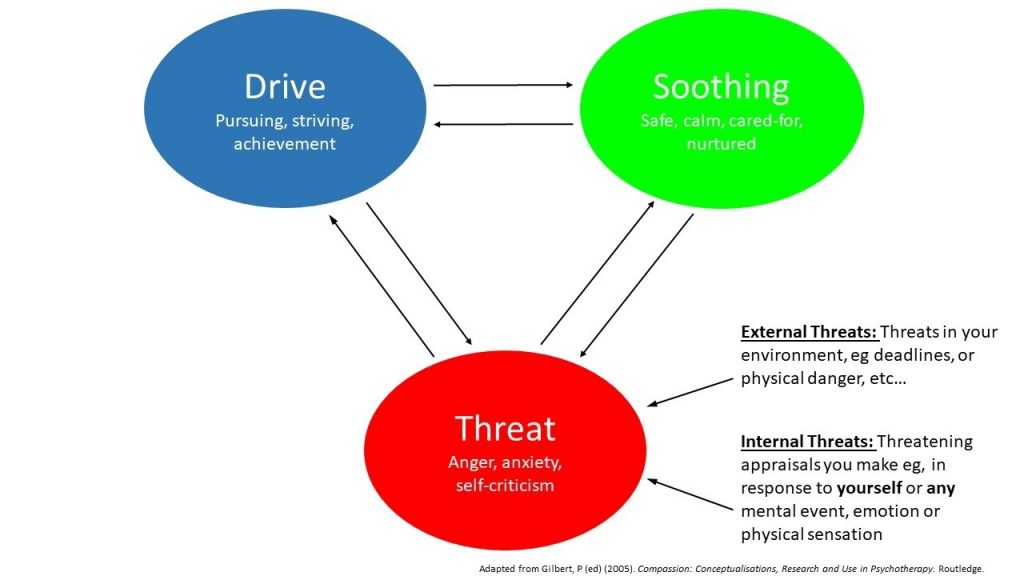Mental well-being and balance
I am fortunate enough to be working at a place which prioritized mental wellbeing. Recently attended such a session. Thought of creating a quick blog entry. I think it’s quite relevant in these times so read on. Session was taken by Vibeke Lunding-Gregersen from Mindwork, so a big Thanks to her!
So, lets talk about how we handle emotions. There are three systems to manage emotions, called the Three circle model. Here’s a diagram ( source).

These three systems are
1) Drive system ( motivation, achievement, want-to-do-something-awesome kind of stuff that pushes us)
2) Threat system ( Primitive, the survival instinct, run from danger, avoid risk, don’t jump you fool.. all that stuff)
3) Soothing system ( the ‘human’ touch, rest, support, care, kindness, peace )
Yeah, already the modern life that we live in is stressful. It is. Add a nice little global pandemic to the mix and you have the perfect recipe for getting stressed. So much so that our threat system has taken the centre stage. We are all affected by it in someway or the other. Insecurity, anxiety, uncertainty have kept the threat system activated ( remember that threat system is primitive, most powerful, the one which used to make sure that we take caution and hide or run so that the neighborhood lion doesn’t eat us for breakfast.. ) and it usually resolves in frustration, rage – of course not out in the open. Just under the skin, You know it but no one else has to have any clue.
Many activities like sports, dinner parties, Friday bars, get-togethers that give us energy and joy are unavailable. This too makes accessing that already hard to get self-motivations, even harder.
In short term, this way of working has actually resulted in increase in productivity. More flexible time, no distractions, no commute etc. seem to be the surface reasons but if the attitude to never stop working, working long hours, not-having-anything-else-to-do-so-let’s-work and put off all other activities is the real reason then it can have long term adverse effects. Human brain needs rest. Period.
All this can cause imbalance between the above three systems. As noted, the Threat system, the primitive 120 million year old brain of Homo sapiens (irrespective of skin color, we all) will switch to survival mode. That makes us more edgy, that feeling of working all the time and not getting much done, damn we all are carona-tired. That makes us more prone to think more about what’s not working for us and brain tries to categorize people in two groups, yup two big groups : who are with us and who are not with us. Of course, we know it’s not that practical or feasible or reasonable. Tell that to your primitive brain. Anyway, such feeling, like real survival feeling is actually experienced by soldiers who are in a war zone. In their case, this threat system might save their lives and they rely on it. But their green system, the soothing system is very much reliable. It’s their troop, team, battalion – not sure what’s the right word here, but you get my point. It’s the feeling that there are people who have my back, no matter what. This provides them with psychological safety and it’s very important to function.
So, talking more about this psychological safety. Being safe, knowing your team is there for you, someone has your back soothes the Threat system which leaves us with space for actually innovating, creating and doing some knowledge work. If this is not prioritized then Silence will win. Silence here is analogous to being disconnected, and to keep to ourselves. Not just our honest thoughts but also the knowledge that might help with some work situation. Vibeke mentioned some actual recent examples where not sharing knowledge lead to mishaps.
So, in these times we need to be even more active in sharing our thoughts, reflections. More often than ever. Otherwise the old brain is ready to take over and again categorize people in either with us or not with us. Friends or enemies. Ha! Imagine looking at your colleague and you can categorize them either as your friend OR your enemy, those are the only two options. Damn! Anyway, in our case since we are nice good people we won’t really be hitting our enemies but we do tend to consider them as fools or useless amateurs. Well, if you find yourself thinking like this, take a step back, take a few deep breaths, calm down your threat system and your old primitive brain. Let the more competent and compassionate new brain take over. Good strategies in these scenarios are : give the other person benefit of doubt and thinking about how can You be helpful.
Now here are some concrete strategies suggested by Vibeke to help us:
1) Structure : sounds boring but have structure to your day, have a good morning routine, schedule your workday even when working from home. Make a evening routine focusing more on relationships and relaxation. Follow these routines, it gives a sense of normalcy. This is proven tactic and known to have helped people who were kept in actual captivity. Like prisons and stuff. So have a structure.
2) Breaks : Real breaks. Brain breaks. No checking your phone, No making that all-so-important phone call during the break. Do not stimulate your brain with new information during your breaks. If possible make a physical shift when you take break. If you are working in living room, go to kitchen or bedroom. Get that work laptop out of sight during breaks!
3) Avoid Multitasking: Humans cannot multitask. It’s a fact. Sadly, we are always shift tasking. Too many browsers tabs are open, in too many windows. Checking your phone counts as shift tasking. Lets drop some numbers: When you think you are doing more by multi tasking you are probably going to take 40% longer to complete either of the tasks, 50% chances of making mistakes and.. wait of it, just might be on the way to loose 15 IQ points. Yeah. Also called as getting dumber in plain English. She made a great point by mentioning that these numbers are similar with people who smoke joints. So, if smoking joints isn’t allowed in Nordea, multi-tasking should also be avoided. Just stick to doing one-thing-at-a-time.
4)Social contact and connected feeling needs to be nurtured. Have unplanned meetings. Prefer video calls.
5) Worries : You can’t stop worrying but worrying all the time isn’t helping. Funny strategy coming up: schedule worry-time. Yeah. From 14:30-15:00, that’s the time I am going to worry about anything that’s worrisome. Other times, Nope. During the worry-time if you realise that you have no control over certain thing : accept and care is the only way. If you realise you can Control: then make a plan to address what’s bothering you.
6) Control your smartphone: Let’s drop a number about people from the US of A. So, 83% Americans haven’t done anything in last 24 hours. Reason: (notso)smartphones! There’s enough being said about this, we all know but if you are talking with someone, put that thing away please. Be decent. Mere presence of a smartphone in a room where 2 people are having conversation affects the quality of the conversation. Does not have to be a phone belonging to either of them. It doesn’t even have to be a phone! Just something that resembles a phone is enough to do the damage. So, you know what to do.
7) Breathe. Calmly. Whenever , wherever. Helps. A lot. ( May I shamelessly plugin the Indian breathing practices of “Pranayama”? Google. )
8) Smile. More. Often.
Ok, that’s it. These were my notes and my interpretation from the session. Thanks a lot to the team that organized it.
If you have made it this far in reading my blog, do one more thing.
Make a cup of coffee or tea or whatever.
Go to the window.
Drink it while looking outside the window, at the sky or at the street.
Ladies and Gentlemen, That’s a break.
Category: Uncategorized

Shantya, good to see your blog after long time.
Most importantly, it’s the topic which is so delicate that we all need to discuss this openly and work on it to retain our (in)sanity!
Agree Adi. Mental wellbeing needs to prioritised along with physical wellbeing.
Wah shantanau wah
Achha hai
Actually tips are useful and practical!!!
It is difficult to make someone aware about these and really hard to make believe on these emotinal things!!!!
It’s the only hurdle I think!!!!
Thanks for briefing the talk !!!
Thanks Rutuja. It’s a bit late but nevertheless we are realising the importance of mental fitness and wellbeing which affects every aspect of our life.